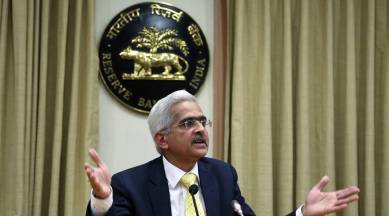RBI Governor cautions: Adverse climate events can change inflation trajectory
‘Distribution of south-west monsoon in the backdrop of a likely El Nino weather pattern needs to be watched carefully’

Although inflation trajectory has seen significant softening in March-April 2023, adverse climate events have the potential to change the direction of the inflation trajectory, RBI Governor Shaktikanta Das cautioned in the minutes of the Monetary Policy Committee (MPC) meeting held on June 6 to 8.
The retail inflation or CPI eased to an 18-month low of 4.7 per cent in April from 5.7 per cent in March. It further declined to 4.25 per cent in May.
monthly limit of free stories.
with an Express account.
According to the RBI Governor, compared to April, uncertainties on the inflation outlook for the second half of the current fiscal have not abated.
“The spatial and temporal distribution of the south-west monsoon in the backdrop of a likely El Nino weather pattern needs to be watched carefully, especially for its impact on food prices. International prices for key food items like rice and sugar are at elevated levels,” Das wrote in the MPC minutes released on Thursday.
“Adverse climate events have the potential to quickly change the direction of the inflation trajectory,” Das said.
In the June 8 policy, the six-member MPC left the repo rate unchanged at 6.5 per cent for the second consecutive time in a row. The panel revised downward the CPI projection marginally to 5.1 per cent from an earlier estimate of 5.2 per cent while retaining the real GDP growth target at 6.5 per cent.
The RBI Governor said inflation is now projected to average 5.1 per cent in 2023-24 compared to 6.7 per cent in 2022-23, but this would still be above the target.
“The disinflation towards the target rate of 4 per cent (for CPI) is likely to be gradual and protracted,” Das said. The RBI has been mandated by the government to keep consumer price index-based inflation (CPI) at 4 per cent with a band of +/- 2 per cent. Geo-political tensions, uncertainty on crude price trajectory and volatile financial markets pose further upside risks to prices, he said, adding that these considerations warrant close monitoring of the evolving price dynamics.
Das, who voted for keeping repo rate unchanged in the June policy, said the full impact of the 250 basis point (bps) rate hike over the past one year is still unfolding. “Our fight against inflation is not yet over. We need to undertake a forward-looking assessment of the evolving inflation-growth outlook and stand ready to act, if the situation warrants,” he said.
Das also voted to continue with the policy stance of ‘withdrawal of accommodation’ given the surplus liquidity in the banking system and as there is a need to align headline inflation with 4 per cent target on a durable basis, the minutes showed.
RBI Deputy Governor Michael D Patra said that beyond the first quarter, pressure points emanating from specific supply-demand mismatches could impart upward pressure to the momentum of prices and offset favourable base effects, especially in the second half of 2023-24. “Hence, monetary policy needs to remain in ‘brace’ mode, ensuring that the effects of these shocks dissipate without leaving scars on the economy,” Patra wrote in the minutes.
He voted for maintaining the status quo on the policy repo rate and to continue with the withdrawal of accommodation stance. “Holding the rate unchanged should not be interpreted as the interest rate cycle having peaked, but as a period of careful evaluation of a decision on the extent of additional policy tightening, if needed,” Patra said.
One of the external MPC members, Jayanth R. Varma, who voted for keeping the repo rate unchanged, expressed his reservation on the withdrawal of accommodation stance. “…I find that with every successive meeting, this stance is becoming more and more disconnected from reality,” he wrote in the minutes.
Varma said he seriously considered dissenting on the withdrawal of the accommodation stance, but after careful thought decided to confine himself to expressing reservations on it. “The main reason for not dissenting is that, after two successive meetings at which the repo rate has been left unchanged, this stance now appears more vestigial than a serious statement of intent,” Varma said.
He also warned that the monetary policy is dangerously close to levels at which it can inflict significant damage to the economy.
Another external member of the MPC, Ashima Goyal, said inflation is falling as per the expectations but it is important that real repo rate does not rise too high.
She said research suggests that the inflation targeting regime has contributed to reducing inflation expectations. Commitment to such a regime only involves aligning the nominal repo rate with expected inflation. “Such action, together with the greater impact of official communication in emerging markets, is adequate to bring inflation to target as the effect of shocks dies down. It does not require the nominal repo to be kept higher for longer,” Goyal wrote in the minutes.